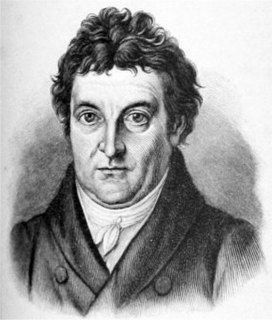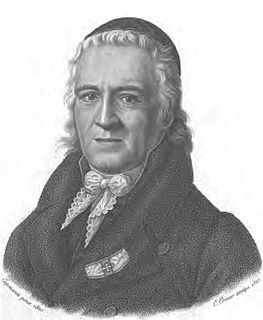
Johann Gottlieb Fichte was a German philosopher who became a founding figure of the philosophical movement known as German idealism, which developed from the theoretical and ethical writings of Immanuel Kant. Recently, philosophers and scholars have begun to appreciate Fichte as an important philosopher in his own right due to his original insights into the nature of self-consciousness or self-awareness. Fichte was also the originator of thesis–antithesis–synthesis, an idea that is often erroneously attributed to Hegel. Like Descartes and Kant before him, Fichte was motivated by the problem of subjectivity and consciousness. Fichte also wrote works of political philosophy; he has a reputation as one of the fathers of German nationalism.

Georg Wilhelm Friedrich Hegel was a German philosopher and the most important figure in German idealism. He is considered one of the fundamental figures of modern Western philosophy, with his influence extending to the entire range of contemporary philosophical issues, from aesthetics to ontology to politics, both in the analytic and continental tradition.
Dialectic or dialectics, also known as the dialectical method, is at base a discourse between two or more people holding different points of view about a subject but wishing to establish the truth through reasoned methods of argumentation. Dialectic resembles debate, but the concept excludes subjective elements such as emotional appeal and the modern pejorative sense of rhetoric. Dialectic may thus be contrasted with both the eristic, which refers to argument that aims to successfully dispute another's argument, or the didactic method, wherein one side of the conversation teaches the other. Dialectic is alternatively known as minor logic, as opposed to major logic or critique.
Antithesis is used in writing or speech either as a proposition that contrasts with or reverses some previously mentioned proposition, or when two opposites are introduced together for contrasting effect. This is based on the logical phrase or term.

In the 19th century, the philosophers of the 18th-century Enlightenment began to have a dramatic effect on subsequent developments in philosophy. In particular, the works of Immanuel Kant gave rise to a new generation of German philosophers and began to see wider recognition internationally. Also, in a reaction to the Enlightenment, a movement called Romanticism began to develop towards the end of the 18th century. Key ideas that sparked changes in philosophy were the fast progress of science, including evolution, most notably postulated by Charles Darwin and Jean-Baptiste Lamarck, and theories regarding what is today called emergent order, such as the free market of Adam Smith within nation states. Pressures for egalitarianism, and more rapid change culminated in a period of revolution and turbulence that would see philosophy change as well.

German idealism was a philosophical movement that emerged in Germany in the late 18th and early 19th centuries. It developed out of the work of Immanuel Kant in the 1780s and 1790s, and was closely linked both with Romanticism and the revolutionary politics of the Enlightenment. The best-known thinkers in the movement, besides Kant, were Johann Gottlieb Fichte, Friedrich Wilhelm Joseph Schelling, Georg Wilhelm Friedrich Hegel, and the proponents of Jena Romanticism. August Ludwig Hülsen, Friedrich Heinrich Jacobi, Gottlob Ernst Schulze, Karl Leonhard Reinhold, Salomon Maimon, Friedrich Schleiermacher, and Arthur Schopenhauer also made major contributions.
A dialectician is a philosopher who views the world in terms of complementary opposites and the interactions thereof. In popular usage, the central feature of dialectic is the concept of "thesis, antithesis, synthesis" – when an idea or phenomenon (thesis) arises, it carries within itself the seed of its opposite (antithesis), and the interplay of these polarities leads to a synthesis, which is somehow beyond the scope of either polarity alone. In turn, the synthesis is now itself a new thesis, and the entire process can begin again.

The Phenomenology of Spirit (1807) is Georg Wilhelm Friedrich Hegel's most widely discussed philosophical work; its German title can be translated as either The Phenomenology of Spirit or The Phenomenology of Mind. Hegel described the work as an "exposition of the coming to be of knowledge". This is explicated through a necessary self-origination and dissolution of "the various shapes of spirit as stations on the way through which spirit becomes pure knowledge".

Karl Leonhard Reinhold was an Austrian philosopher who helped to popularise the work of Immanuel Kant in the late 18th century. His "elementary philosophy" (Elementarphilosophie) also influenced German idealism, notably Johann Gottlieb Fichte, as a critical system grounded in a fundamental first principle.
Heinrich Moritz Chalybäus was a German philosopher best known for his exegetical work on philosophy, such as his characterisation of Hegel's dialectic positing a triad of "thesis–antithesis–synthesis."

Naturphilosophie is a term used in English-language philosophy to identify a current in the philosophical tradition of German idealism, as applied to the study of nature in the earlier 19th century. German speakers use the clearer term Romantische Naturphilosophie, the philosophy of nature developed at the time of the founding of German Romanticism. It is particularly associated with the philosophical work of Friedrich Wilhelm Joseph von Schelling and Georg Wilhelm Friedrich Hegel—though it has some clear precursors also. More particularly it is identified with some of the initial works of Schelling during the period 1797–9, in reaction to the views of Fichte, and subsequent developments from Schelling's position. Always controversial, some of Schelling's ideas in this direction are still considered of philosophical interest, even if the subsequent development of experimental natural science had a destructive impact on the credibility of the theories of his followers in Naturphilosophie.
Aufheben or Aufhebung is a German word with several seemingly contradictory meanings, including "to lift up", "to abolish", "cancel" or "suspend", or "to sublate". The term has also been defined as "abolish", "preserve", and "transcend". In philosophy, aufheben is used by Hegel to explain what happens when a thesis and antithesis interact, and in this sense is translated mainly as "sublate".
A trichotomy is a three-way classificatory division. Some philosophers pursued trichotomies.
Dieter Henrich is a German philosopher. A contemporary thinker in the tradition of German idealism, Henrich is considered "one of the most respected and frequently cited philosophers in Germany today," whose "extensive and highly innovative studies of German Idealism and his systematic analyses of subjectivity have significantly impacted on advanced German philosophical and theological debates."

Ernst Platner was a German anthropologist, physician and Rationalist philosopher, born in Leipzig. He was the father of painter Ernst Zacharias Platner (1773–1855).
Philosophical Inquiries into the Essence of Human Freedom is an 1809 work by Friedrich Schelling. It was the last book he finished in his lifetime, running to some 90 pages of a single long essay. It is commonly referred to as his "Freiheitsschrift" or "freedom essay".
Tom Rockmore is an American philosopher. Although he denies the usual distinction between philosophy and the history of philosophy, he has strong interests throughout the history of philosophy and defends a constructivist view of epistemology. The philosophers whom he has studied extensively are Kant, Fichte, Hegel, Marx, Lukács, and Heidegger. He received his Ph.D. from Vanderbilt University in 1974 and his Habilitation à diriger des recherches from the Université de Poitiers in 1994. He is Distinguished Professor Emeritus at Duquesne University, as well as Distinguished Humanities Chair Professor at Peking University.
The following is a list of the major events in the history of German idealism, along with related historical events.

Marxist philosophy or Marxist theory are works in philosophy that are strongly influenced by Karl Marx's materialist approach to theory, or works written by Marxists. Marxist philosophy may be broadly divided into Western Marxism, which drew out of various sources, and the official philosophy in the Soviet Union, which enforced a rigid reading of Marx called dialectical materialism, in particular during the 1930s. Marxist philosophy is not a strictly defined sub-field of philosophy, because the diverse influence of Marxist theory has extended into fields as varied as aesthetics, ethics, ontology, epistemology, theoretical psychology and philosophy of science, as well as its obvious influence on political philosophy and the philosophy of history. The key characteristics of Marxism in philosophy are its materialism and its commitment to political practice as the end goal of all thought. The theory is also about the hustles of the proletariat and their reprimand of the bourgeoisie.

Dialectical materialism is a philosophy of science, history, and nature developed in Europe and based on the writings of Karl Marx and Friedrich Engels. Marxist dialectics emphasizes the importance of real-world conditions, in terms of class, labor, and socioeconomic interactions. This is in contrast to the Hegelian dialectic, which emphasizes the observation that contradictions in material phenomena could be resolved by analyzing them and synthesizing a solution whilst retaining their essence. Marx supposed that the most effective solution to the problems caused by said contradictory phenomena was to address and rearrange the systems of social organization at the root of the problems.








